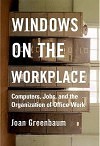United States
In September 1969 Monthly Review published Margaret Benston’s article, “The Political Economy of Women’s Liberation”–one of the most important early intellectual contributions to the current wave of feminist struggle in the United States. In the more than three decades since we have continued to publish articles by socialist feminists (along with a steady flow of important feminist texts through Monthly Review Press’ New Feminist Library) | more…
It was just over a year ago that we asked John Bellamy Foster and Robert W. McChesney to serve as acting co-editors of Monthly Review, with a view to having four co-editors. Although Foster and McChesney were naturals for undertaking this responsibility—they are longtime MR contributors and MR Press authors—the type of collegiality necessary to make a publication like MR tick is delicate and difficult to predict. We therefore thought it desirable that they be “acting” co-editors, to provide for a trial period. In the past year we have worked together in a truly collective way, published some of our best issues, and circulation has grown at a rapid pace. In addition to political economy and socialist education, John and Bob have opened MR up to new areas where we are now on the cutting edge. John is among the three or four leading environmental sociologists, and Bob holds similar distinction as a media and communications scholar. Moreover, both John and Bob have been active in radical movements for much of the past two decades. There is a lot of ballyhoo nowadays about public intellectuals. In John and Bob we have two of the very best of the breed. To top it off, they are genuinely warm and loving individuals with whom everyone enjoys working. MR’s morale has not been this high in a very long time. We are thus happy to announce that these two younger friends and colleagues are joining us as permanent—no longer “acting”—co-editors of Monthly Review | more…

In the culture of the modern West, we see ourselves as thinking subjects, defined by our conscious thought, autonomous and separate from each other and the world we survey. Current research in neurology and cognitive science shows that this picture is false. We think with our bodies, and in interaction with others, and our thought is never completed. The Fiction of a Thinkable World is a wide-ranging exploration of the meaning of this insight for our understanding of history, ethics, and politics. | more…
Two decades after the Carter and Reagan administrations launched their attacks on the U.S. regulatory system the world is littered with the wreckage of neoliberal deregulation. Seldom have these failures loomed so prominently, however, as in the rolling blackouts that swept much of California in January of this year. These rolling blackouts were implemented by California power authorities in a desperate attempt to deal with a burgeoning crisis in the availability of electrical power resulting from the deregulation of California’s electrical power companies beginning in 1996. The deregulation legislation, passed unanimously by the California state legislature, promised a 20 percent drop in electricity rates by 2002. Rates for final consumers were to be frozen at around 50 percent above the national average for up to four years (1998-2002), during which time the ratepayers were required to contribute to paying off the “stranded assets” of the major private utility companies, consisting of billions of dollars in bad investments in nuclear power facilities. So far, California ratepayers have paid out seventeen billion dollars to the private electrical utilities under these provisions. Deregulation also required the utilities to sell off their power generation facilities (with the exception of some hydropower and nuclear facilities). | more…
The attention given to the Florida elections in the US presidential race has highlighted the horrendous fact that in Florida and throughout the South thirty-five years after the passage of the Voting Rights Act there are numerous ways in which African Americans are prevented from voting. Thus Florida is one of fourteen states that bar ex-criminal offenders from voting even after they have completed their sentences. In Florida alone more than 400,000 ex-criminal offenders who at one time received felony convictions but who have now completed their sentences and are no longer in prison, on probation, or on parole have been barred from voting in this way. This includes almost one-third of black men in that state and more than 200,000 potential African-American voters, 90 percent or more of whom could have been expected to vote Democrat if they had voted. This situation in Florida and other states is documented in a 1998 report entitled Losing the Vote, issued by Human Rights Watch and the Sentencing Project, available on-line at http://www.hrw.org/reports98/vote/. Given the fact that under the present criminal injustice system African Americans are far more likely to be arrested and given felony convictions than their white counterparts this becomes an effective means of political control. | more…

Since 1964, the Socialist Register has brought together leading writers on the left to investigate aspects of a common theme. This volume examines the new U.S.-led imperialist project that is currently transforming the global order, its impact on different regions of the world, and on gender, media, and popular culture. | more…
In an article on the role of third parties in U.S. presidential elections in the August 21, 2000, issue of In These Times, founding editor and publisher James Weinstein observed: In 1948, when I cast my first vote for president, Henry A. Wallace, vice president during FDR’s second and third terms, was running as the Progressive Party candidate against Republican Thomas Dewey and Democrat Harry S. Truman. | more…
In the United States, the creation of wealth is often presented as a process that benefits everyone within the society. A common shibboleth, made famous during the Kennedy administration, is that “a rising tide lifts all boats.” In June 2000, the Conference Board, an organization devoted to the promotion of global business and one of the leading private centers for the analysis of economic statistics, released a report actually entitled Does a Rising Tide Lift All Boats? The report concludes: “Unfortunately, the answer to date is ‘no ’” | more…

This volume brings together the work of leading Marxist analysts of imperialism to examine the burning question of our time—the nature and prospects of the U.S. imperial project currently being given shape by war and occupation in the Middle East. | more…
We would like to thank Ellen Meiksins Wood and Michael Yates for their help at different stages in the development of this special issue. Ellen proposed the idea of having such an issue this summer, initiated it, and started the ball rolling by sending invitations defining the issue to the bulk of the contributors included here. Michael worked mightly, editing manuscripts and helping bring the project to fruition. We owe a debt of gratitude to them both | more…
On keeping the MR flag flying: Between us there are 177 years of life. The issue of continuity has plagued us for some time and we have from time to time explored and experimented with ways of maintaining the unique tradition of MR as an independent, nonsectarian advocate for and educator on socialism and Marxism. With that in mind, we have asked John B. Foster and Robert W. McChesney to assume the responsibility of being Acting Editors. We are pleased that they have agreed. In addition to their direct editorial responsibilities, John and Bob will participate in the development of a more permanent editorial board as well as a battery of contributing editors, not only academics but also labor and social movement activists. We expect to continue to guide the magazine as long as possible | more…

In this eye-opening book, Joan Greenbaum tells the story of changes in management policies, work organization, and the design of office information systems from the 1950s to the present. Windows on the Workplace takes us behind the news stories of the highly efficient, high-tech workplace and shows us the ways in which technologies—computers, mobile phones, the internet—have been adapted by management to reshape the way work is done. In tracing the introduction of new technologies, Greenbaum reveals how organizations use them to benefit from both increased profits and more intense control over the workforce. | more…



